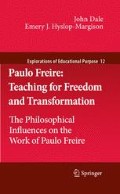Abstract
From the discussion of humanization in the previous chapter, we proceed to an analysis of Marxist and existentialist influence on Freire’s ideas, pedagogy, and revolutionary spirit. In both Marx and Freire’s work a relationship exists between materialist dialectics, epistemology, and metaphysics. Freire adopted Marx’s analysis of contradictory social relations and the idea formed the basis of his moral outrage with capitalism’s inequities. Freire also embraced Jean-Paul Sartre’s philosophical assumptions supporting the belief in absolute human freedom. Sartre’s existentialism is a philosophy of “being” and “existence.” Yet “being” cannot be understood through purely rational thought, it must be understood as well through existence and lived experience. Freire’s philosophy of education encapsulates both of these understandings.
Access this chapter
Tax calculation will be finalised at checkout
Purchases are for personal use only
References
Allman, P. (1999). Revolutionary social transformation: Democratic hopes, political possibilities and critical education. London: Bergin and Garvey.
Althusser, L. (1973). Essays on ideology. London, UK: Thetford Press.
Baudrillard, J. (1989). Selected writings. M. Poster (Ed.). Cambridge, UK: Cambridge University Press.
Ernsberger, D. C. (2009). The labor theory. Retrieved January 12, 2009, from http://www.isil.org/resources/lit/labor-theory-val.html
Freire, P. (1996). Letters to Cristina. New York: Routledge.
Freire, P. (1997). Pedagogy of the heart. New York: Continuum.
Freire, P. (1998a). Pedagogy of freedom: Ethics, democracy, and civic courage. New York: Rowman & Littlefield.
Freire, P. (2000). Pedagogy of the oppressed. New York: Continuum.
Godonoo, P. (1998). Tribute to Paulo Freire: His influence on scholars in Africa. Convergence, 31(1–2), 30–38.
Hegel, F. W. (2007). Lecures on the philosophy of spirit. Oxford, UK: Oxford University Press.
Hekman, S. J. (1995). Moral voice, moral selves. University Park, PA: Pennsylvania State University Press.
Hyslop-Margison, E. J. (2005). Liberalizing vocational study: Democratic approaches to career education. Lanham, MD: University Press of America.
Hyslop-Margison, E. J., & Naseem, M. A. (2007). Scientism as neo-liberal ideology. Dordrect, Netherlands: Springer Publishing.
Hyslop-Margison, E. J., & Thayer, M. (2009). Teaching democracy: Citizenship education as critical pedagogy. Rotterdam: Sense Publishers.
Kincheloe, J, Slattery, P, & Steinberg, S. (2000). Contextualizing teaching. Boston, MA: Allyn & Bacon.
Locke, J. (1988). Two treatises of government. Cambridge, UK: Cambridge University Press.
Marx, K. (1976). The German ideology. New York: International Publishers.
Marx, K. (1938) Theses on Feuerbach. London, UK: Lawrence & Wishart.
Palmer, D. (2001). Looking at philosophy: The unbearable heaviness of philosophy made lighter. Boston, MA: McGraw Hill.
Saint-Simon. (1975). The political thought of Saint Simon. Oxford, UK: Oxford University Press.
Sartre, J. (1957). Jean-Paul Sartre, existentialism and human emotions. New York: Philosophical Library.
Stumpf, S. E. (1989). Philosophy: History and problems. New York: McGraw Hill.
Tucker, R. C. (1978). Marx and Engels Reader. New York: W. W. Norton & Company.
Warnock, M. (1970). Existentialism. London: Oxford University Press.
Author information
Authors and Affiliations
Corresponding author
Rights and permissions
Copyright information
© 2011 Springer Science+Business Media B.V.
About this chapter
Cite this chapter
Dale, J., Hyslop-Margison, E.J. (2011). Marxism, Existentialism, and Freire. In: Paulo Freire: Teaching for Freedom and Transformation. Explorations of Educational Purpose, vol 12. Springer, Dordrecht. https://doi.org/10.1007/978-90-481-9100-0_4
Download citation
DOI: https://doi.org/10.1007/978-90-481-9100-0_4
Published:
Publisher Name: Springer, Dordrecht
Print ISBN: 978-90-481-9099-7
Online ISBN: 978-90-481-9100-0
eBook Packages: Humanities, Social Sciences and LawEducation (R0)

